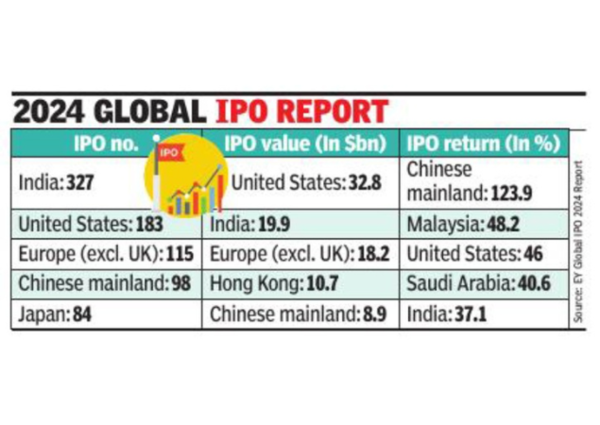BENGALURU: Investors are finding India an attractive destination for initial public offerings of new startups, showing signs of resilience, especially as other markets remain sluggish. “The business landscape in India has changed dramatically, mainly due to the dynamic initial public offering market. This shift is affecting founder behavior, forcing them to focus on positive unit economics, profitability and growth. The key measure of entrepreneurial success now lies in the company’s ability to go public and continue to meet public market expectations. Global investors are eyeing India as an attractive IPO market as mutual funds and institutional investors show keen interest in profitable, technology-based venture capital-backed listings. .
Last year, 13 startups were listed on the exchange, and this number is expected to increase, with 25 startups preparing for IPOs this year. Its portfolio companies include food tech platform Swiggy, which went public in November last year, while jewelry retailer Bluestone has also submitted a draft IPO prospectus.

Last year, India achieved an important milestone, ranking first in the world in terms of number of IPOs, significantly surpassing the US and European markets. An Ernst & Young report shows that a total of 330 companies were listed in the Indian market, creating capital of US$19.9 billion. Compared with 2023, the number of IPOs increased by 36% and funds raised increased by 150%. The fastest country.
Recently, Accel raised $650 million for its eighth India-focused fund, as revealed in a U.S. Securities and Exchange Commission (SEC) filing. As the first institutional investor in 80% of its portfolio companies, Accel’s portfolio includes notable startups including Freshworks, BrowserStack, Urban Company and Zetwerk.
By the time the eighth tranche of funds closes, Accel said the money will be deployed to 50-60 companies, Kirani said. “Our goal is to have at least 40 high-quality Series A companies investing $12 million to $15 million per company,” he said. The fund will be deployed to manufacturing-focused startups – from India to Global (startups catering to global diversified supply chain needs), local Indian companies (startups focusing on intellectual property-driven value-added manufacturing) , enterprises at the intersection of service industry and manufacturing industry. “We are targeting founders in Bharat who can tap into the existing consumer market worth over $500 billion. The potential for revenue generation in this segment is huge. These consumers demand service excellence at par with urban standards and are looking for Similar experience.
Many investors have high hopes for the development of India’s manufacturing industry. “We’ve seen this with a lot of manufacturing companies in India, asset-light companies going global, and we continue to look for unique IP manufacturing companies in India that serve as import substitution first. Can I substitute first in India? Once So, can I go global? he added.
By analyzing the sourcing patterns of 100-200 leading Indian companies such as Flipkart, Freshworks and Swiggy, we found that their purchasing methods are as sophisticated as any international company. “By developing solutions for these 200 companies while maintaining global scalability, one can build world-class businesses in India. This trend is becoming more and more obvious. We have invested in about 6 to 7 companies that follow this This model company’s initial sales target is these 200 organizations,” Killani said.








